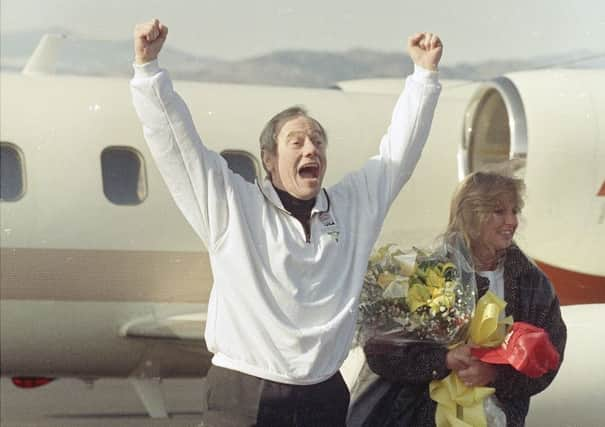Obituary: Thomas Sutherland


Thomas Sutherland was among a group of westerners who were taken hostage in Beirut in 1985 at the height of Lebanon’s civil war – by then in its ninth year. He was abducted while driving from the airport to his home in Beirut: for six years he was held in darkened and depressing rooms under severe restraints – chained and blindfolded – with other hostages, notably the journalist Terry Anderson, the BBC reporter John McCarthy and the Archbishop of Canterbury’s peace envoy Terry Waite.
Sutherland had joined the faculty at the American University of Beirut during a turbulent time in Lebanon’s affairs – the university president had been shot that year. But Sutherland refused to let the war disrupt his love of teaching: “When you’re teaching class” he once said, “you can’t pay any attention to the gunfire. Otherwise you lose the attention of the students, and they get worried and want to leave.”
Advertisement
Hide AdAdvertisement
Hide AdThomas McNee Sutherland was the son of a dairy farmer and attended Falkirk High School, where he was a diligent pupil and a talented footballer. After leaving school, he signed for Rangers while reading agriculture at Glasgow University but his studies did not allow time for football. He graduated in 1953 and wrote a PhD in animal science at Iowa State University. He then joined the agriculture faculty at Colorado State University, where he was appointed a professor of animal genetics.
Although he was to spend much of his life in America – and became an American citizen – Sutherland remained a proud Scot. He retained ‘a strong Scottish lilt’ when speaking (a colleague has written) and wore the kilt at social events and delighted in giving readings of Robert Burns.
He created a tradition at Colorado University of always wearing the kilt on the last day of class – thus leaving a lasting impression on his students. Indeed, when he was welcomed back to America at Fort Collins airport he was greeted by a vast crowd and the skirl of the bagpipes.
In 1983 he accepted the challenge to be first Dean of Agriculture at the American University in Beirut, which was known as the Harvard of the Middle East. Sutherland and his wife Jean, who taught English, became an integral part of university and Beirut life.
They flew back to America in June 1985 to attend their daughter’s wedding and on returning to Beirut were picked up by the university president’s chauffeur. Within five minutes the car was stopped and Sutherland was manhandled into the boot. Later he was pulled out of the car with his captors screaming: “The eyes; the eyes. Cover the eyes.”
Sutherland later wrote in his book (At Your Own Risk): “Though I blessedly didn’t know it then, that was the last time I would see the sun for the next six and a half years.”
The severe conditions, unending cruelty and harsh lifestyle were dire. Worse was the boredom. Sutherland gave Anderson lessons in French which Sutherland spoke fluently (“we practised irregular verbs” Anderson recalled) while Anderson taught Sutherland to play chess and bridge. Anderson was quoted as saying, “Tom said I saved his life. I say he saved mine.”
The brutality and violence was unceasing. Once Sutherland tried to take off his blindfold and was promptly beaten and sent into solitary confinement. He was savagely beaten by a rubber truncheon on the soles of his feet by his Hezbollah abductors.
Advertisement
Hide AdAdvertisement
Hide AdThe captives were constantly moved around subterranean cells. Sutherland tried to suffocate himself on several occasions but the memory of his wife and three daughters stopped him committing suicide: ‘Gee, I can’t go through with this, and I would pull it off” he wrote in his book.
In 1991 a deal was brokered through the United Nations for his release. Sutherland had spent 2,353 days in captivity and returned to find all the houses in Fort Collins decked with yellow ribbons. He returned to his work at Colorado State University, where he became professor emeritus after his retirement.
Sutherland and the hostages initiated a case in the American courts. He was awarded $35m by the Iranian government who had aided the Lebanese captors. The Sutherlands set up the Sutherland Family Foundation, which gave much of their funds to charities. In his retirement Sutherland became keen on amateur dramatics and helped the Bas Bleu Theatre Company.
In a forward to Sutherland’s book former President George HW Bush wrote, “Tom Sutherland is a true American hero. …He was a hostage, yes; but he never felt sorry for himself nor did he complain of his situation. He inspired us all with his grit and his unfailing faith in his God and his country.”
Sutherland is survived by his wife and their three daughters.
ALASDAIR STEVEN